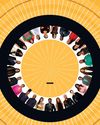
The survey was, at least on the surface, designed to deduce what kind of country Americans would like future generations to inherit.
Each person was presented with 55 separate goal statements for the nation "People have individual rights" was one; "People have high-quality health care" was another-and asked to rank them in order of importance. Each person was also asked how each goal would be ranked by "other people." When the results were tallied, the surprise was not that "People have individual rights" came in first, or that "People have high-quality health care" finished second. The surprise was the third highest priority: "Successfully address climate change." We know that's a surprise because, on the list of what "other people" considered important, climate came in 33rd. In other words, no one thought their fellow Americans saw climate as the highpriority item nearly everyone actually considered it to be.
That gap between what we ourselves think and what we reckon others must be thinking-may hold the power to upend a great deal of what we believe we know about American civic life.
"People are lousy at figuring out what the group thinks," Rose says. This collective blind spot is a quirk he would underline to students when he was teaching the neuroscience of learning at Harvard. At Populace, the think tank he co-founded to put such knowledge to practical use, the foible plays a prominent role in efforts to undo what Rose calls the "shared illusion" that Americans are hopelessly divided.
And divided we certainly think we are. The only thing Americans seem to agree on is that Americans cannot agree on anything. It's hardly worth summarizing the headlines about doom and radicalization. In the prelude to a November ballot featuring the candidate synonymous with polarization, all the dapple and nuance of life is once again being reduced to a binary. Choose a side: red or blue.
Denne historien er fra July 15, 2024-utgaven av Time.
Start din 7-dagers gratis prøveperiode på Magzter GOLD for å få tilgang til tusenvis av utvalgte premiumhistorier og 9000+ magasiner og aviser.
Allerede abonnent ? Logg på
Denne historien er fra July 15, 2024-utgaven av Time.
Start din 7-dagers gratis prøveperiode på Magzter GOLD for å få tilgang til tusenvis av utvalgte premiumhistorier og 9000+ magasiner og aviser.
Allerede abonnent? Logg på

CAVALCADE OF COMEDY
As Saturday Night Live celebrates its 50th season, alumni look back on the people, moments, and humor that shaped their time at an American institution

The Summer of Scam that never ended
EARLY IN THE NEW NETFLIX SERIES APPLE CIDER VINEgar, its star, Kaitlyn Dever, breaks the fourth wall.

The Italian 'Trump whisperer'
ITALIAN PRIME MINister Giorgia Meloni's political fortunes are far brighter than any other G-7 leader's.

The (real) problem with fake plants
WHEN THE GERMAN PHILOSOPHER IMMANUEL KANT puzzled over why nature looks beautiful to us, he considered the case of replicas.

Insecurity is the new inequality
DONALD TRUMP'S SECOND PRESIDENTIAL TERM HAS already been accompanied by a cascade of unnerving political and natural events-from the U.S.'s leaving the World Health Organization and the Paris Climate Accords, to the nighttime firings of inspectors general and pardons of the Jan. 6 rioters, to the raids targeting immigrants in a number of cities and the wildfires roaring through swaths of Los Angeles.

TIME the Closers
25 BLACK LEADERS WORKING TO END RACIAL INEQUALITY

THE PAW PATROL PRINCIPLE
How a toy company built a children's-television juggernaut

Mindy Kaling The writer, producer, and showrunner on the status of Legally Blonde 3, cooking with Meghan Markle, and her new Netflix comedy, Running Point
The family in Running Point has shades of Succession. Was that show on your mind?

A THOUSAND CUTS
THE STANDOFF AT 1300 PENNSYLVANIA AVENUE was not much of a spectacle.

DeepSeek's hidden warning for AI safety
THE RELEASE OF DEEPSEEK R1 STUNNED WALL STREET and Silicon Valley in January, spooking investors and impressing tech leaders.